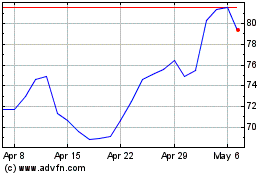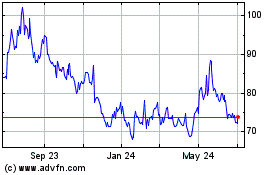By Xie Yu and Jing Yang
In its path to becoming one of the world's most valuable
startups, Ant Group Co. built a complex financial ecosystem that
captured huge sums of money and kept millions of people in it by
supplying them with credit and managing their investments.
Now, Beijing is forcing the Chinese financial-technology giant
to scale back its activities and dismantle arrangements that have
given Ant a big advantage over its rivals as well as the country's
banks and traditional financial institutions.
This week, the People's Bank of China outlined a five-pronged
rectification plan for Ant, which will fall fully in line with
regulations by applying to become a financial-holding company
overseen by the central bank. Ant, an affiliate of Alibaba Group
Holding Ltd., will be subject to regulations similar to those
governing banks, which will curtail some of its growth
prospects.
Ant's mobile payments and lifestyle app Alipay, which has more
than one billion users in China, has in recent years sought to
generate bigger profits from its customers by directing them toward
other financial services such as online loans and a giant
money-market mutual fund where they can park their money. In the
year to June 2020, Ant reported profit of $5.8 billion on revenue
of $21.5 billion.
Half a billion Chinese citizens used Ant's microlending services
in the year to June 2020, and they had the equivalent of more than
$264 billion in outstanding loans at that point. And at the end of
last year, more than 690 million people -- or close to half of
China's population -- were invested in Ant's flagship money-market
mutual fund, which had $182 billion in assets under management.
The central bank Monday said Ant needs to shrink the giant fund
and reduce its risks. It said Ant also needs to break an
"inappropriate link" between its microlending and payments
services, and curb monopolistic behavior in how it collects,
controls and uses consumer data.
Ant used to aggressively market its virtual credit card service
to Alipay users while they were making purchases. Many of them were
prompted to select Huabei -- which means "Just spend" -- as their
default payment option, and some individuals inadvertently selected
it without realizing they had opted for that.
Ant partnered with banks that supplied most of the credit to
Alipay users, and Ant took a cut of the interest income. The ease
of borrowing from Huabei also led many young Chinese citizens to
borrow money to spend on luxury goods and lifestyles they couldn't
afford.
Following the central bank's directive, Ant will stop pushing
Huabei in this manner.
Regulators don't want Ant to "nudge people into using consumer
credit that they don't need," said Martin Chorzempa, a research
fellow at the Peterson Institute for International Economics,
adding that regulators want other credit-card providers, such as
banks, to operate on an even playing field.
Ant has been benefiting from "cross-pollination across different
lines of business that have positive feedback effects on each
other," said Eswar Prasad, a Cornell University professor and
former head of the International Monetary Fund's China division.
Users' payment histories have also helped Ant develop internal
scoring systems to gauge their creditworthiness, helping to
strengthen Ant's dominance of the financial-services sector, he
said.
Chinese financial regulators are uneasy about the intertwined
nature of Ant's services. "Therefore, it is best to separate the
various businesses and supervise them individually to avoid
cross-selling," said Ma Xiangyun, an analyst with Soochow
Securities.
Ant's giant money-market mutual fund, known as Yu'e Bao -- which
means "leftover treasure" -- was started in 2013. It was the first
of its kind globally: an online-only fund that people could put
money in at any time of the day with a minimum investment of just 1
yuan, equivalent to $0.15.
By early 2018 it had become the world's biggest money-market
mutual fund, with close to $260 billion in assets under management,
effectively keeping the money within Ant's ecosystem and allowing
Ant to earn fees from it.
Financial regulators grew concerned and pressured Ant to shrink
the fund. Ant has given Alipay users other investment options, but
regulators want it to do more.
Monday's directive from the central bank said Ant will have to
reduce the liquidity risks of its investment products and lower the
assets under management of Yu'e Bao. Regulators have long worried
about a situation where the fund's manager can't sell its
underlying assets quickly if many investors pull out at the same
time, which could cause them to incur losses.
"It's a remote problem but real. It is remote until many people
suddenly want their money," said Richard Turrin, a
financial-technology-industry consultant.
Ant was valued at $150 billion in a private fundraising round in
mid-2018, and last fall was on track to go public at a valuation in
excess of $300 billion when its blockbuster initial public
offerings were scuttled by Beijing. Some Ant shareholders in recent
months marked the value of their Ant stakes at prices that implied
a company valuation of $230 billion, according to regulatory
filings.
Broadly, Ant's restructuring plan could serve as a blueprint for
other financial-technology companies in China, said Mr. Prasad. "It
is likely to result in other companies restructuring themselves in
similar fashion before the heavy hand of the regulator falls on
them," he said.
Write to Xie Yu at Yu.Xie@wsj.com and Jing Yang at
Jing.Yang@wsj.com
(END) Dow Jones Newswires
April 13, 2021 09:35 ET (13:35 GMT)
Copyright (c) 2021 Dow Jones & Company, Inc.
Alibaba (NYSE:BABA)
Historical Stock Chart
From Mar 2024 to Apr 2024

Alibaba (NYSE:BABA)
Historical Stock Chart
From Apr 2023 to Apr 2024
